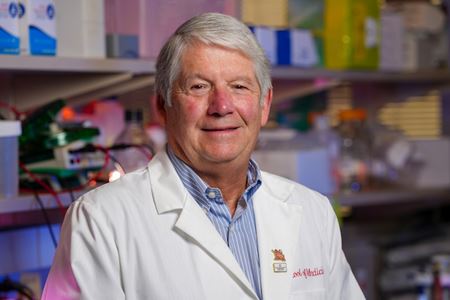Mark Kelley, PhD, now mentors other IU School of Medicine innovators on the path toward commercialization
When Mark R. Kelley, PhD, was a grad student working with fruit flies in the lab, he never imagined that a discovery made in those early days of his career would lead to potential new therapies for cancer, diabetic retinopathy, inflammatory bowel disease and more.
“Fruit flies led the way for a lot of discoveries in genetics,” said Kelley, the Betty and Earl Herr Professor of Pediatric Oncology Research at Indiana University School of Medicine. “The path from fruit flies, moving to mice and human cells, then developing models in cancer—we’ve been following this one protein for over three decades.”
In science, persistence pays off. Kelley is now leading a pharmaceutical startup and seeing real-world, disease-fighting effects from the molecular compound his lab has developed.
“It’s following the science,” Kelley said. “You’ve got to keep your eyes open, and the key is collaboration.”
Over the years, Kelley has collaborated with colleagues at the Herman B Wells Center for Pediatric Research, the IU Melvin and Bren Simon Comprehensive Cancer Center and, most recently, the Eugene and Marilyn Glick Eye Institute to develop new therapeutics for a range of diseases all using the APE1 protein inhibitor APX3330, a molecular compound developed in the Kelley Lab and marketed though Kelley’s startup, Apexian Pharmaceuticals.
In the last 30 years, Kelley has disclosed 61 inventions, been awarded 19 patents and licensed three of his innovative technologies to other companies.
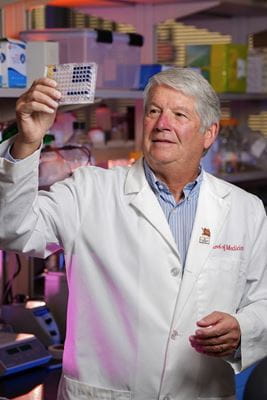 Apexian, the company he started with support from former Eli Lilly and Company scientists and local angel investors, is now bringing APX3330 to clinical trials. It’s showing promising results in patients with a number of cancers including pediatric sarcomas, pancreatic and bladder cancer. Other trials are being launched for eye conditions including diabetic retinopathy. And new data shows the same drug target could be effective in treating inflammatory bowel diseases such as Crohn’s disease and ulcerative colitis.
Apexian, the company he started with support from former Eli Lilly and Company scientists and local angel investors, is now bringing APX3330 to clinical trials. It’s showing promising results in patients with a number of cancers including pediatric sarcomas, pancreatic and bladder cancer. Other trials are being launched for eye conditions including diabetic retinopathy. And new data shows the same drug target could be effective in treating inflammatory bowel diseases such as Crohn’s disease and ulcerative colitis.
“Once we had the target, I started looking for other diseases where the transcription factors that are regulated by our target protein play a role,” Kelley explained. “The unique thing is our target will block critical pathways in cancers, is anti-angiogenic and it is anti-inflammatory.”
The anti-inflammatory and anti-angiogenic properties are what make Kelley’s discovery such a powerful crossover drug for fighting numerous diseases. It can prevent chemotherapy-induced neuropathy, block ocular angiogenesis leading to vision loss, and guard against colitis. A recently completed Phase 2 clinical trial for diabetic retinopathy showed the oral pill could delay worsening of the eyes, potentially reducing the need for eye injections and guarding against loss of vision.
“We have other potential uses in the retinal space, and while we’re working on that, we’re still doing our work in cancer,” Kelley said. “In fact, we recently received a new grant in pancreatic cancer.”
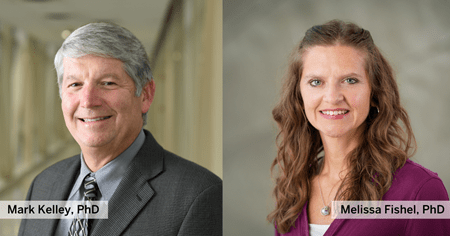 The 5-year, $2.4 million grant from the National Cancer Institute (NCI) will allow Kelley and Melissa Fishel, PhD, assistant professor of pediatrics at IU School of Medicine, to explore new therapies that target the critical pathways pancreatic tumors use to survive. Fishel co-leads the cancer center’s Pancreatic Cancer Challenges and Solutions Working Group, aiming to improve outcomes for a disease that has a 5-year survival rate of just 12%.
The 5-year, $2.4 million grant from the National Cancer Institute (NCI) will allow Kelley and Melissa Fishel, PhD, assistant professor of pediatrics at IU School of Medicine, to explore new therapies that target the critical pathways pancreatic tumors use to survive. Fishel co-leads the cancer center’s Pancreatic Cancer Challenges and Solutions Working Group, aiming to improve outcomes for a disease that has a 5-year survival rate of just 12%.
“We always want to give a cancer patient more time with their loved ones and without the terrible side effects (common with chemotherapy),” Fishel said.
Kelley also co-leads the Cancer Drug Discovery and Development Accelerator, an initiative launched by the cancer center in 2019 to accelerate the journey from research to the clinic by fostering collaborations between IU researchers, pharmaceutical industry veterans, technology cores and external research organizations. His leadership and expertise are helping IU School of Medicine advance its 2030 Strategic Plan priorities for translational research.
![]() “His work provides a roadmap for other investigators who are looking to commercialize their discoveries,” said Wells Center Director Reuben Kapur, PhD.
“His work provides a roadmap for other investigators who are looking to commercialize their discoveries,” said Wells Center Director Reuben Kapur, PhD.
Kapur and Kelley have collaborated on development of potential therapies using APX3330 in pre-leukemia, leukemia and ulcerative colitis.
“The impact of his research has been widespread on many different diseases that are driven by inflammation and/or DNA damage,” Kapur said.
Paving the way for IU innovators
It's not easy for a scientist to navigate the fast-paced world of life-science startups. The experience and insights Kelley has gained along the way now help other innovators commercialize their discoveries.
“I’ve had a lot of scars and roadblocks doing this over the last 30 years,” Kelley said. “I think we’re really set up now to take discoveries scientists are making and move them forward faster and more efficiently.”
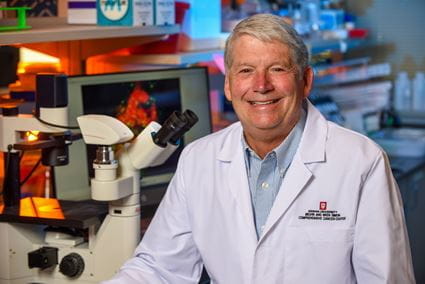 Kelley sought help from the IU Innovation and Commercialization Office (ICO) and IU Ventures, an IU affiliate helping faculty advance high-potential new venture opportunities. In fiscal year 2023, the ICO helped IU innovators realize 144 new invention disclosures, 317 patent applications, 98 received patents, $6.5 million in revenue generated from licensing, and the launch of four startups. Kelley has worked closely with Stephanie Sellers, PhD, an ICO manager and IU’s associate director of technology commercialization.
Kelley sought help from the IU Innovation and Commercialization Office (ICO) and IU Ventures, an IU affiliate helping faculty advance high-potential new venture opportunities. In fiscal year 2023, the ICO helped IU innovators realize 144 new invention disclosures, 317 patent applications, 98 received patents, $6.5 million in revenue generated from licensing, and the launch of four startups. Kelley has worked closely with Stephanie Sellers, PhD, an ICO manager and IU’s associate director of technology commercialization.
These resources for IU innovators have expanded concurrently with Kelley’s discoveries in the lab.
“I was a tech manager in the late ’90s back when Mark was getting started in his research, so I worked with Mark to get a lot of the initial patents that led to the formation of his company later on,” said Tony Armstrong, JD, MBA, president and CEO of IU Ventures. “It was almost like the Middle Ages when we started this—funding in the life sciences back then was especially hard to get.”
From 1997 to 2000, Armstrong led the protection and commercialization of intellectual property developed within the IU system. He later served as executive director of the Indiana 21st Century Research and Technology Fund, providing early-stage investments for collaborative research partnerships for the state of Indiana.
“Mark has persevered and really been a leader for the university and for Indiana in thinking about what we can take from the bench to the bedside,” Armstrong said. “He’s been at this for 25 years, figuring out how to turn his research into a product that will improve people’s lives and alleviate suffering. It’s commendable the diligence, perseverance and grit it has taken to do what he has done.”
Now, as a member of the IU Ventures Investment Committee and mentor with the IU Philanthropic Venture Fund, Kelley helps other faculty members navigate the path toward their own life sciences startups.
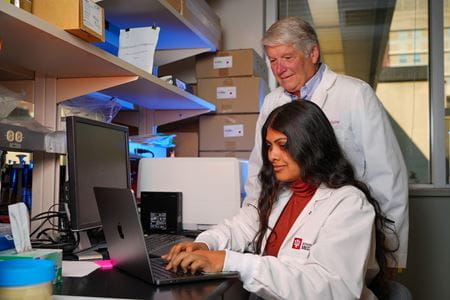 “In addition to being an excellent scientist, teacher and administrator, Dr. Kelley is an extraordinary mentor,” Kapur said. “He has made significant contributions to the development and success of many junior faculty members in the Wells Center. This achievement of Dr. Kelley has been recognized by him being awarded the Merv Yoder mentor award.”
“In addition to being an excellent scientist, teacher and administrator, Dr. Kelley is an extraordinary mentor,” Kapur said. “He has made significant contributions to the development and success of many junior faculty members in the Wells Center. This achievement of Dr. Kelley has been recognized by him being awarded the Merv Yoder mentor award.”
Fishel has been working alongside Kelley since she was a PhD student in the late 1990s and admires his ability to move research forward, stretching budgets and building collaborative teams to “achieve great science.”
“He really introduced me to molecular biology and translational research,” Fishel said. “I have always loved to think about how to use the data we get to kill more cancer cells. He has taught me to think about the big picture and how to ask the right questions.”
Fishel, who now has her own lab, continues to work with Kelley to investigate new therapies for difficult-to-treat, aggressive cancers like pancreatic and pediatric sarcomas. Other Kelley lab collaborators include Jill Fehrenbacher, PhD, who received a grant with Kelley to study the effectiveness of APX3330 to prevent or reverse chemotherapy-induced peripheral neuropathy. Timothy Corson, PhD, is collaborating with Kelley to explore the same drug’s ability to treat ocular neovascularization.
Kelley is also teaming up with Department of Pediatrics Chair D. Wade Clapp, MD, to lead the newly established Pediatric and Adult Translational Cancer Drug Discovery and Development Training Program (PACT-D3), supported by a grant from the National Cancer Institute. The program will pair fellows and grad students with a cancer center mentor, enabling them to explore career paths in drug development.
“The PACT-D3 program will provide students with an in-depth understanding of what it takes to bring a drug from the lab bench all the way to commercialization,” Kelley said. “There are a lot of additional opportunities to do cancer drug discovery and development in large pharma and biotech, as well as patent law and licensing. Our job is to train students who will contribute to society in the discovery and development of new cancer treatments.”
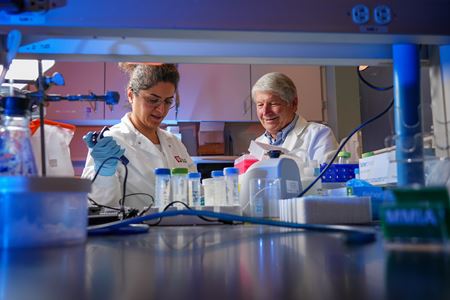 If anyone has the experience to help trainees navigate that process, it’s Kelley.
If anyone has the experience to help trainees navigate that process, it’s Kelley.
“He is one of the leading faculty researchers who have become successful entrepreneurs,” Armstrong said. “I can’t think of anybody who gives back more to the university than Mark.”
Kelley, whose research has been continuously funded by the National Institutes of Health for over 30 years, never loses sight of the purpose behind his science, mentorship and entrepreneurism.
“What keeps me going is the ultimate reward of getting new therapies out there to help the people who need it,” Kelley said, “to see your science validated by getting those therapies to patients in clinical trials and, hopefully, see people taking a drug that you developed and having it help them.”
